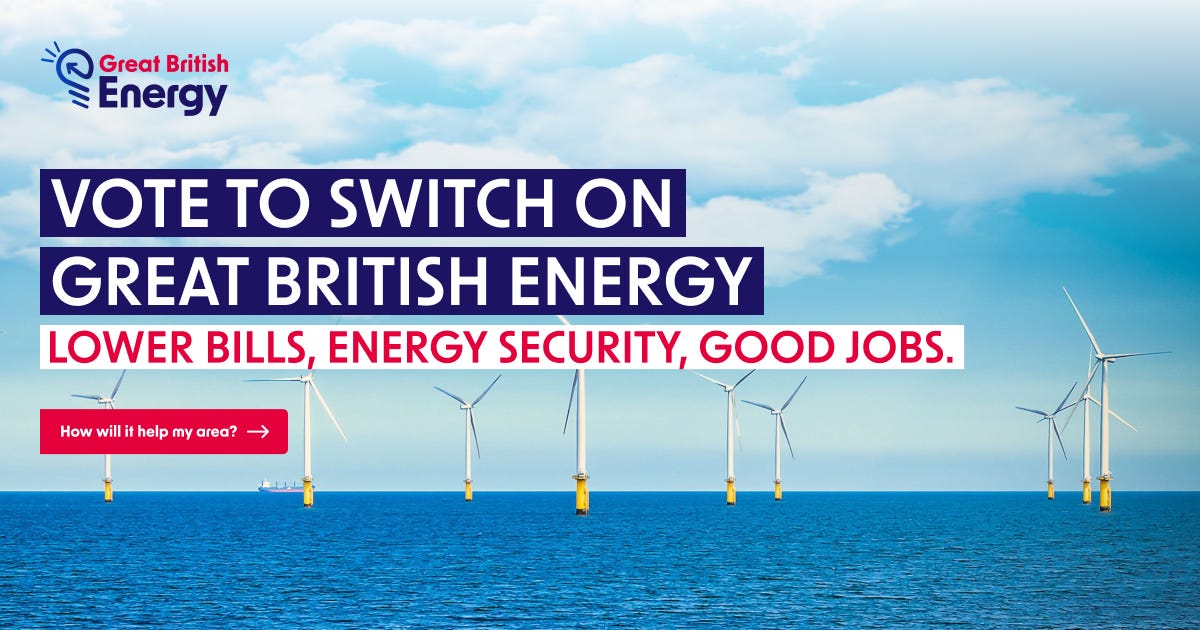Watt's the Catch? Weighing up the Benefits of Great British Energy
I have a confession, I’ve never voted Labour before, but this year I did and here is why I have high hopes for what's yet to come.
In the UK, as many will know we have just had a general election and I have to admit I’ve never been a Labour voter before but after reading their manifesto, something hit me that SOLD THEM TO ME.
Great British Energy (GBE).
As someone passionate about sustainable energy and preserving our land for future generations, I was immediately drawn to the idea of a publicly-owned energy company focused on securing the nation's energy future and environmental goals. Why, I wonder, has no government proposed this sooner?
With energy prices soaring and the push for renewables intensifying, many view this as a strategic move to stabilise markets and secure greener energy sources—a bold, perhaps overdue, intervention.
However, the initiative has ignited debate, with both advocates and critics highlighting its benefits and drawbacks. As a natural-born philosopher (and true to my Libra roots), I tend to weigh both sides without firmly taking one. So, here’s my reflection on the pros and challenges of Great British Energy.
Pros - Obviously it’s a jolly good move! 👍
1. Energy Security
One of GBE’s primary goals would be to strengthen the UK’s energy security. Global energy markets have become increasingly volatile due to geopolitical tensions and supply chain disruptions (remember how petrol prices spiked when the war in Ukraine began? Ouch).
A publicly-owned energy company could prioritise national interests over profits, ensuring a stable domestic supply and shielding the country from price shocks especially vital during a cost-of-living crisis.
2. Promoting Renewable Energy
GBE would place a strong emphasis on renewable energy, aligning with the UK's goal of reaching net-zero carbon emissions by 2050. To be blunt, we’re far from meeting those targets. A public energy company investing in wind, solar, and other green technologies could accelerate the transition from fossil fuels, moving us closer to that goal while also creating green jobs and giving the economy a needed boost.
3. Price Stabilisation
Last winter, all UK residents felt the sting of soaring energy bills, with low-income households hit the hardest. In my view, a public utility company would allow the government to have greater control over pricing, ensuring households aren’t disproportionately impacted by market fluctuations. It would also provide an alternative to the private sector’s profit-driven approach.
4. Long-term Strategic Investment
This would be a great investment in our future! One key advantage of state-owned enterprises is their ability to prioritise long-term investments, unlike private companies, which often focus on short-term profits. As a public energy firm, GBE could invest in long-term infrastructure projects like offshore wind farms or nuclear energy, even if they don’t yield immediate returns. This long-term perspective could enhance both energy resilience and sustainability.
5. National Dividend
A publicly-owned energy company could reinvest its profits into public services, potentially providing a "national dividend" for the British public. The revenue generated could help fund healthcare, education, and other essential services, delivering tangible social benefits that extend far beyond the energy sector.



Cons - Is this all just hot air? 👎
1. Potential inefficiency
Without the profit-driven efficiency of private companies, GBE risks becoming bureaucratic, slow to innovate, or poorly managed, leading to higher costs. Similar concerns arose with British Rail (1948-1997), which, despite its extensive network, faced criticism for inefficiency and declining service quality sparking debate about the benefits of privatisation versus public ownership.
2. High Upfront Costs
Establishing GBE would require significant capital investment, potentially straining public finances amid other pressing issues like inflation and healthcare. Critics suggest the funds might be better spent on expanding renewable energy subsidies or efficiency programs, but some argue it's worth investing to find out.
3. Crowding Out Private Investment
The creation of a large public energy company could discourage private firms from investing in the UK’s energy market. If they feel they can't compete with a government-backed entity, they may pull back on investments in renewables, potentially stifling a dynamic and flowing market. As a self-proclaimed champagne socialist I still admit capitalism is essential for us to rise and thrive as a nation, I believe a lack of competition could ultimately harm innovation and, in the long run, drive up costs for consumers and no one wants that.
4. Global Market Limitations
A publicly-owned energy company wouldn't make the UK immune to global energy markets, as the country relies heavily on imports like gas. Global price shocks could still impact domestic prices, and GBE would face competition from larger, more experienced international energy companies, limiting its global effectiveness.



So let’s bring it all together
The creation of Great British Energy presents a bold and potentially transformative approach to the UK’s energy future and one that ultimately got my vote.
Having a public company addressing key challenges, such as energy security, rising prices, and the transition to renewable energy seems like a great idea. However, the mountain ahead does involve some potentially nasty crevasses and death zones like potential inefficiencies, high costs, and the risk of stifling private investment.
Ultimately, the success of GBE would depend on careful implementation, strong leadership, and a clear commitment to long-term goals. If done well, it could provide lasting benefits to both consumers and the environment. However, mismanagement or political interference could undermine its objectives, leading to higher costs and fewer benefits for the public.
For me, there’s no choice but to give it our full British resolve. If we don't try, we'll never know what’s possible. And even if it doesn’t succeed, there will always be a way forward, just look at HS2.





